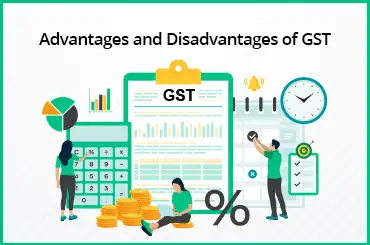The SAC Code, which stands for Services Accounting Code, is an important code that distinguishes and categorizes different services under the Goods and Services Tax (GST) system.
Businesses must abide by several classification codes under the Indian tax system to be properly taxed. The SAC Code is one such unique categorization code created especially for services. It represents an important component of the intricate Indian tax structure.
In this blog, we have discussed the SAC Code's definition, how it differs from the HSN Code, its format and structure, and its significance in many tax-related areas. We have also discussed SAC Code misunderstandings and how to find the best SAC Code for your company's services.
What Is SAC Code?
This section will provide insights to help understand more about the SAC Code's meaning, structure, and format:
1. Definition of SAC Code
The Services Accounting Code (SAC) Code is a unique code assigned to different services provided under GST and it helps in the classification and identification of services for the purpose of taxation, invoicing, submitting GST reports, collecting input tax credit (ITC), and compliance. Each service is assigned a specific SAC Code, which is used to determine the applicable GST rate for that service. The Indian tax system uses the SAC categorization code to identify and group services. It is a six-digit numeric number based on the global categorization scheme for services recognized as the Central Product Classification (CPC) of the United Nations.
2. How is SAC Code Different from HSN Code?
It is significant to highlight that the HSN (Harmonised System of Nomenclature) Code, used for product classification, and the SAC Code used for services are two independent systems. The format and organization of the SAC Code and HSN Code are different. The SAC Code employs a 6-digit system, whereas the HSN Code has a 4-to-8-digit format.
3. SAC Code Structure and Format
The six-digit numerical number known as the SAC code categorizes several service-related features. The main service group is represented by the first two digits of the code, the subcategory by the following two digits, and the specific service assigned to the code is identified by the last two digits. The SAC code's design and vocabulary were developed to establish a comprehensive and uniform definition of services inside the Indian tax system.
Read Also - Benefits of GST
4. How is SAC Code Used in GST?
The SAC Code is crucial to India's GST system and serves several purposes including:
- Invoicing: When creating service invoices, businesses must remember to incorporate the relevant SAC Code along with other crucial information like the product or service's description, pricing, and other details. Accurate billing with the relevant SAC Code is crucial for accurate tax calculation and GST compliance.
- Filing GST Returns: Businesses must detail the services they offer in standard GST returns, and precise service accounting in such returns depends on the SAC code. You need to use the correct SAC code when reporting GST returns to comply with regulatory requirements, thereby ensuring accurate tax filing.
- Claiming Input Tax Credit: The provider must have a valid GSTIN and have correctly submitted returns to assert input tax credit under GST. In order to confirm that the supplier has paid taxes, the recipient needs tax invoices and the provider's GST returns. Services used for commercial purposes are eligible for the credit, which reduces the recipient's output tax obligation.
- Determining Tax Liability: GST uses SAC to categorize services in order to determine tax liability. Based on the SAC code and the location where the service is provided, the tax rate that applies to it is established. This enables them to comply with tax laws and regulations correctly. You need to establish GST charges and collections based on your relevant SAC Code thereby guaranteeing compliance with the rules.
5. Examples of SAC Code
Here are some examples of SAC Codes for different services:
- SAC Code 998311 – Management consulting services
- SAC Code 998512 – Accounting and bookkeeping services
- SAC Code 998314 – Architectural services
- SAC Code 998732 – Event planning and management services
- SAC Code 998839 – Legal and paralegal services
Read Also - What Is GSTR 2A and How to File GSTR 2A?
Importance of SAC Code
Businesses need to be aware of the significance of the SAC Code to the Indian tax system and its taxation-related functions. Here are a few pointers that help to understand the need and importance of the SAC Code:
SAC Code in Invoicing
Proper invoicing using the appropriate SAC Code is essential for precise tax calculation and compliance with GST requirements. Payment fines and compliance problems may come from incorrect or missing invoice SAC codes.
SAC Code for Filing GST Returns
Services are reported using the SAC code in GST returns. The proper SAC Code must be used when accurately reporting services to ensure compliance with GST rules and prevent any anomalies in returns.
SAC Code for Claiming Input Tax Credit
SAC Code is used to establish which ITCs are applicable for services. For firms to be eligible to get ITC, the services must be accurately classified based on the proper SAC Code, which can save money.
SAC Code for Determining Tax Liability
The SAC Code classification establishes the appropriate GST rate for services. The right SAC Code must be used to classify services correctly to determine the correct tax liability and prevent legal troubles.
Read Also - Difference Between GSTR 2A and 2B
How to Find SAC Code
Businesses can find the appropriate SAC Code for their services through the following methods:
SAC Code Lookup Tool
Companies can use the SAC Code Lookup tool that the government offers on the official GST portal to find the correct SAC Code as per keywords or service specifications.
SAC Code List by CBIC
The Central Board of Indirect Taxes and Customs, i.e., CBIC, provides a list of SAC Codes on its official website. Businesses can refer to this list to find the appropriate SAC Code for their services.
Hiring a Tax Consultant
Businesses may also enlist the expertise of a tax consultant knowledgeable in the Indian tax code and can aid in determining the appropriate SAC Code for their offerings.
Adopting a GST-Compliant Software
A GST-compliant software designed specifically for your industry such as TranZact, can help you add both SAC and HSN codes for services and goods that you sell. This helps you to save time and stay compliant with GST norms. The software gives you the option of adding items or services, along with their SAC or HSN codes, which can then be selected when generating invoices or orders.
Read Also - Detailed Guide to GST Refund Process
Common Misconceptions About SAC Code
It's important to clarify these common misconceptions about SAC Code:
- The SAC code is the same as HSN Code:
HSN Code is used for commodities, while SAC Code is intended just for services. They have different formats, structures, and goals. You need to be aware of the distinctions between the two and use the proper code for relevant classification.
- Only service providers utilize SAC Code:
Although SAC Code is primarily employed for services, its scope also pertains to manufacturers, traders, along with other businesses that provide services. All businesses must understand and abide by the SAC Code's rules.
- SAC Code is not important for small businesses:
All sizes of enterprises, even small firms, are subject to SAC Code. Small businesses must adhere to SAC Code standards to avoid fines and ensure accurate tax calculation and reporting. Read Also - How to File GSTR 9?
Rely on a Software to Stay Compliant With SAC Code Rules
Businesses must adhere to the most current regulations of the Indian tax system, and the SAC code is one of them. The SAC code offers a distinct code to classify various services and ensures the right amount of tax is paid, which is a crucial requirement of the Indian tax system.
To prevent fines and guarantee tax compliance regulations, it's recommended that businesses become acquainted with the SAC code and apply it effectively in their GST forms. TranZact is a GST-compliant, cloud-based software that automates business functions like purchase, sales, procurement, and production. TranZact helps businesses to manage their HSN and SAC codes easily, and create GST-compliant documents and invoices along with integrations with Tally and BUSY accounting software!
FAQs on SAC Code
1. Can I utilize one SAC Code for all my services?
The SAC Code should be chosen following each service's unique characteristics. Certain services may have multiple SAC codes depending on how they are classified.
2. Can the SAC Code be changed once it has been chosen?
A change in the services offered could justify a revision in the SAC Code. However, the updated SAC Code must be accurate and adhere to GST regulations.
3. Is the SAC Code solely applicable to service providers?
No, every business that provides a service or is related to a service offering in any way, comprising manufacturers, traders, and other service providers is subject to the SAC Code regulations.
4. Which SAC Code is appropriate for my services?
To find the appropriate SAC Code for your services, you can utilize the SAC Code lookup tool on the official GST portal or refer to the SAC Code list issued by The Central Board of Indirect Taxes and Customs (CBIC). A tax professional should also be consulted to ensure proper SAC Code classification.
5. Does the SAC code matter to small businesses?
Yes, the SAC Code covers small enterprises along with medium and large enterprises. Small firms must also adhere to SAC Code standards to avoid fines and ensure accurate tax calculation and reporting.
6. Can there be penalties for using the wrong SAC Code?
According to the GST laws, inaccurate or missing SAC codes in bills or GST returns can lead to compliance problems and fines. Utilizing the relevant SAC Code for services is crucial to guarantee effective tax compliance.
















